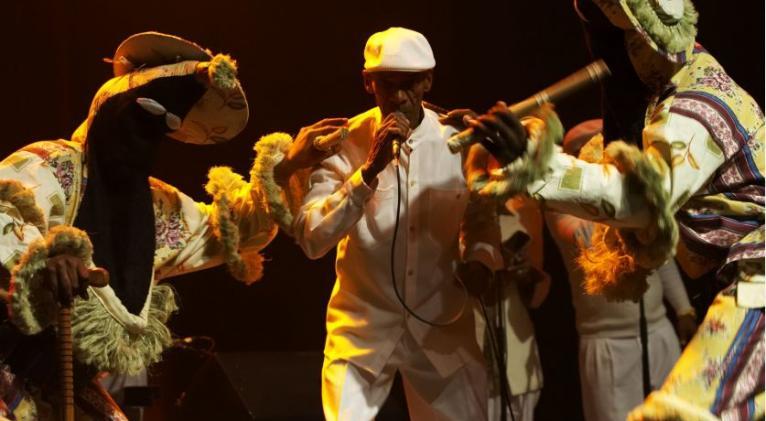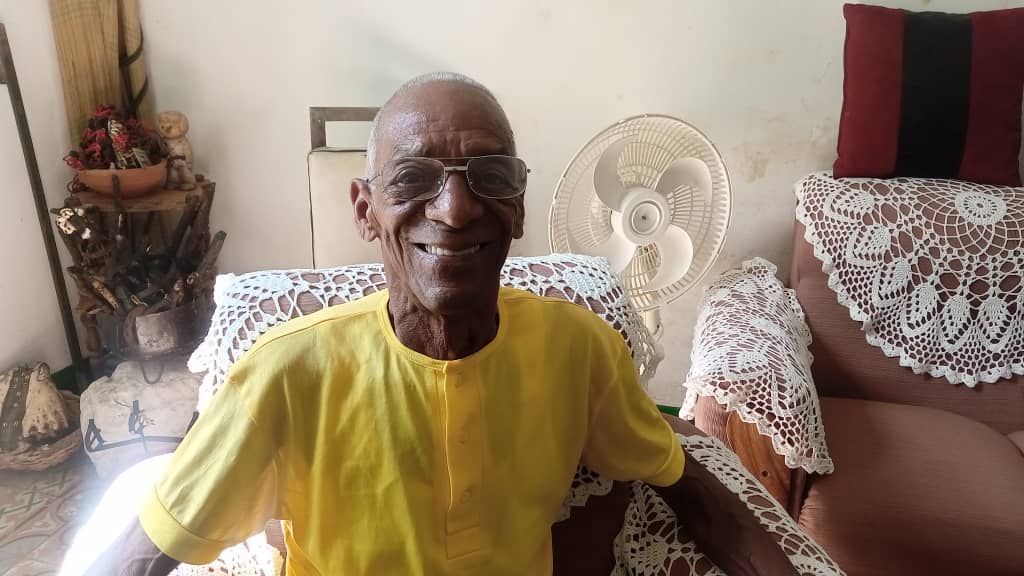Juan Campos Cárdenas, With Rumba in His Veins
especiales

Sitting on the sidewalk in front of his daughter's house, he was waiting for this journalist who arrived at approximately 10:00 a.m., looking for a special interview, because there’s always something new to say about Juan Campos Cárdenas.
Dressed as if he were about to go out, he wore a yellow sweater, jeans, and a smile on his face that showed his desire to party, once again, between questions and answers, because he could spend his life talking about rumba.
Born on February 19, 1938, in Havana, specifically in the "El África" neighborhood of Cayo Hueso, "Chan," as many know him, is a singer and one of the founders of the renowned Yoruba Andabo group.

In an exclusive interview with the Cuban News Agency, he confessed that his mother gave him this nickname because she liked a popular radio show of the time: Chan Li Po.
Of the six siblings in his family, three dedicated themselves to these pursuits, but he claims that from the moment he was born, he already had keys in his hands and rumba ran through his veins.
“My mother belonged to a folk choir, and I was involved in all of that from a young age, but I really got started in the group.
“I was a percussionist in the Estrella de Pueblo Nuevo, until, after leaving, I formed the Estrellita de Pueblo Nuevo myself with people from the neighborhood, my siblings, and well-known neighbors; that's where my musical life in rumba began."
Although he worked for a time at Radio Marianao, he emphasized his work as a stevedore on the docks of Havana's port, which he had to do from a young age to support himself. It was precisely there that he joined the Grupo Marítimo Portuario (Maritime Port Group) and founded Yoruba Andabo in 1961, the birthplace of legendary rumberos; this gave rise to Guaguancó Marítimo Portuario.
It was in 1985 that this group began its professional career under the name Yoruba Andabo.
"At that time, almost everyone in the group worked at the port. Those who weren't laborers were stevedores, or if they weren't, they were crane operators. But all members came from there, and we participated in amateur artist festivals, winning first prize.
“That's how we grew until Little Aché, Merceditas Valdés, priestess of Afro-Cuban music, fell in love with us and took us around the world, starting in Bogotá, Colombia. We then made a recording with her in Canada called El Espíritu de la Rumba, and we traveled to the United States, Venezuela, Mexico, Spain, France, Italy, and so on until I retired.”
Groups such as Papín y sus Rumberos and the group Patakín are part of his artistic career, including the following discographies: Cajones Bullangueros (Yoruba Andabo, unreleased), El Callejón de los Rumberos (Yoruba Andabo), En el Solar la Cueva del Humo (Pancho Quinto), Del Yoruba al Son (Yoruba Andabo), Antología de la Música Afrocubana vol. X (Abakuá, Egrem CD 0744); as well as the filmographies Yoruba Andabo at Home, The Best of Yoruba Andabo, and Rumba in Havana with Yoruba Andabo.
With Timbalaye in his heart and rumba in his veins
Chan doesn't remember exactly when he started with Timbalaye, an international promoter of Cuban culture, but he is infinitely grateful for the welcome of Ulises Mora, president of this festival, which reaches Cuban neighborhoods every August with its rumba route.
"Ulises is a person who has thought of everything and immediately came to me, he has taken me into account and given me the opportunity to share my knowledge. I have toured with them to Italy, Spain, and Mexico, and this reminded me of old times, since after reaching a certain age, one distances oneself a bit from experiences, but thanks to Timbalaye, rumba is kept alive."
At 87, Chan feels encouraged by the recognition of his musical career, as Timbalaye has allowed him to go back in time and remember when he sang, danced, and played with passion.
"This collective still recognizes me for my artistic career, and it makes me feel alive, as Ulises continues to surprise me with recognition and awards. However, I think the most important thing is the love they have shown me and how they have integrated me into the project."
Today, Chan enjoys sharing his experiences with anyone who comes to meet him, and how remembering is a way of life. Instead of living, he prefers to sit in his living room, imagining his best moments and feeling the rumba coursing through his veins.
“Rumba is the greatest musical genre I've ever known; it's a genre that makes you vibrate, and it's impossible to stay still with it.
My relationship with rumba is lifelong. Sometimes they come to me for an activity, or interested students approach me for lessons, and that makes me happy. That they count on me.
Translated by Amilkal Labañino / CubaSi Translation Staff














Add new comment